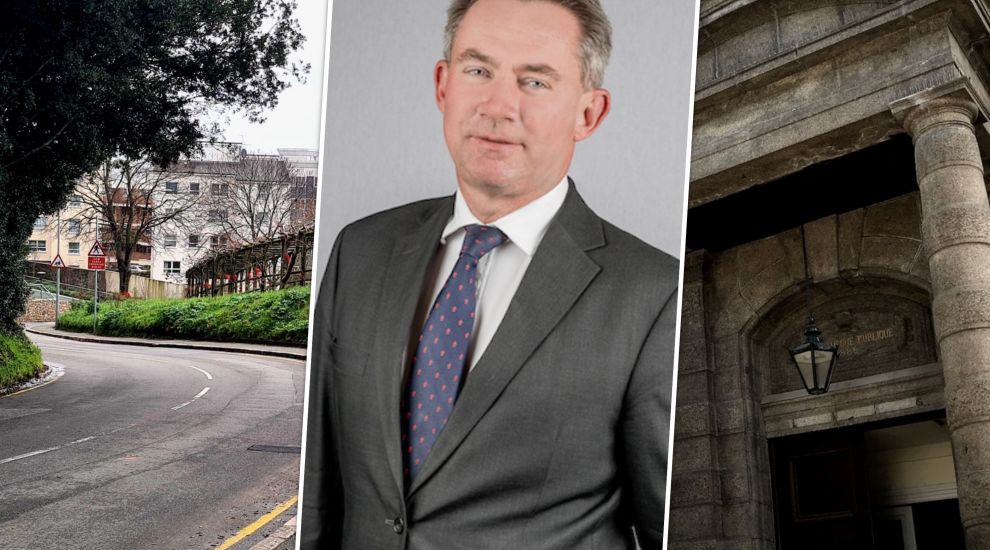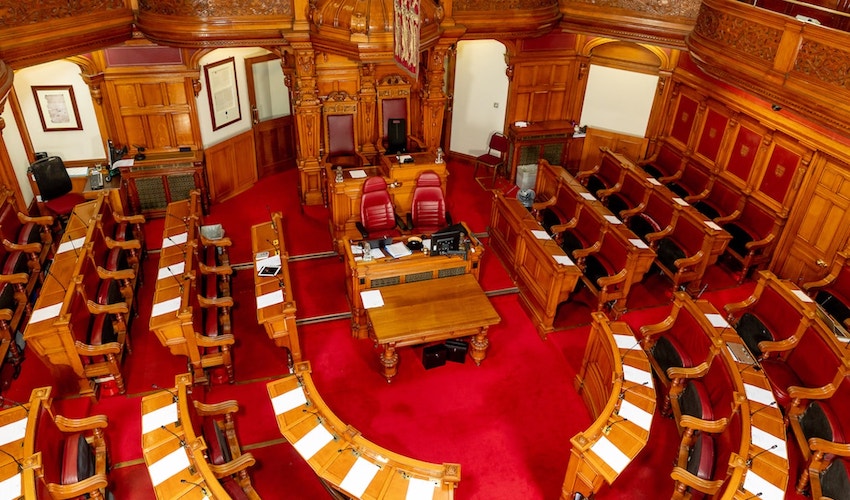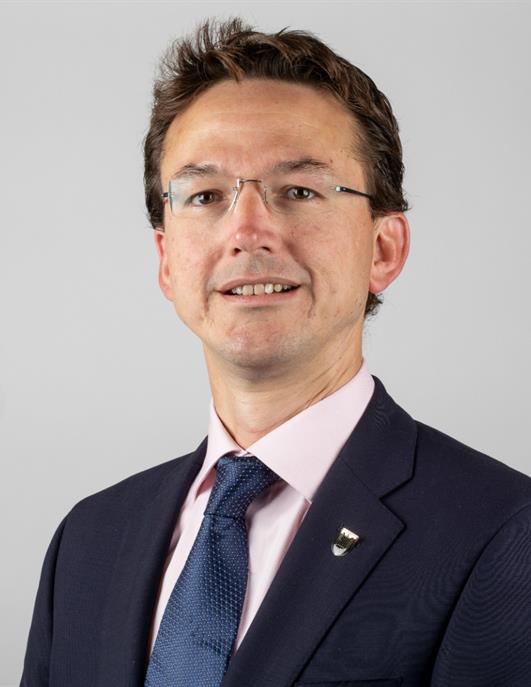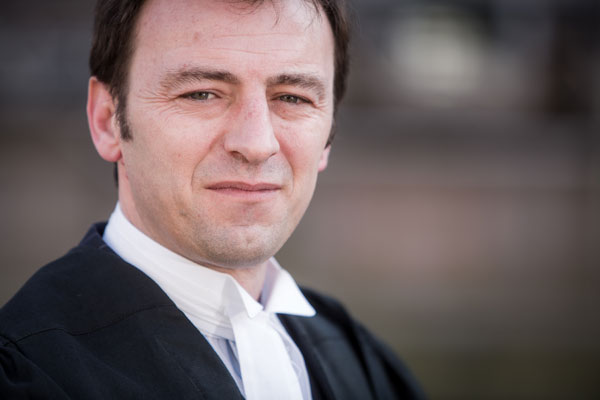

The Attorney General has declined to publicly confirm whether legal action by Westmount residents has put the future hospital project under serious threat because he is giving advice to the Government on the matter.
On 31 January, resident and lawyer Advocate Olaf Blakeley wrote to Government warning of residents’ intentions to challenge the hospital highway plan on two grounds.
While one element concerns whether residents’ human rights are being breached, Express understands that the Royal Court could also be asked to decide if the Government broke the law when it asked Members to give the Assembly power to buy land by compulsory purchase around the new hospital site last November.
In this morning’s States Assembly meeting, Assistant Minister Constable Richard Buchanan sought clarity on “whether there is any potential legal threat to the Overdale Hospital project from the two avenues of legal action… outlined in Blakeley Law’s letter."

Pictured: Constable Richard Buchanan raised the legal challenge in the States Assembly this morning.
But the Attorney General, Mark Temple QC, declined to answer the question, stating that he was advising both the Our Hospital Project Team and the Political Oversight Group on those threats and that his advice “is confidential and subject to legal privilege.”
Deputy Kirsten Morel challenged the Attorney General on the matter, noting that he had not been asked to share any specific legal advice.
“I’m trying to understand why this is the case because the Attorney General has been asked a question separately to any legal advice he’s given elsewhere, so I’d like him to answer the question as asked to the assembly, the Deputy said. “It’s not a question of repeating advice given elsewhere.”
The Attorney General replied: “My answer to that is that it’s a basic point concerning the relationship between lawyers and their clients. I am advising the Our Hospital Project group and the Political Oversight Group and its not open to me as a matter of professional practice to give my privileged and confidential legal advice to repeat it in a public forum because the Our Hospital Project group and the Political Oversight Group are entitled to take legal advice in a confidential way - it’s a basic right of any client in relation to their lawyers.”
He added that Deputy Morel should instead obtain a view from the Solicitor General.

Pictured: Deputy Kirsten Morel pushed the Attorney General to answer the question, stating that the Assembly were simply asking for an answer, not for him to share confidential legal advice.
Arguing that he believed the Attorney General’s “primary responsibility” was to the States Assembly, Deputy Morel then asked in what circumstances he would be able to answer questions from States Members when the matter overlapped with advice given elsewhere.
“…In the vast majority of circumstances, I am able to advise Members in the Assembly concerning their questions… But where, Sir, the matter concerns actual potential litigation, that’s a different set of circumstances… and its very difficult for me to give answers in a public forum in relation to a matter which is by its nature legally privileged and confidential.
“It is the minority of circumstances but, as I’ve said, where I am in that position then we make arrangements with the Solicitor General to give separate advice to Members under an ethical wall, which we can operate in the Law Officers’ Department.”
Deputy Graham Truscott asked the Attorney General to clarify what potential delay the Westmount residents’ legal challenge might bring to the project, noting the project team’s insistence that “time is of the essence”.
However, the Attorney General once again declined to comment.

Pictured: Advocate Olaf Blakeley, himself a Westmount resident, who is representing the Westmount residents in their legal fight.
Deputy Inna Gardiner asked whether it could be arranged for the Solicitor General to answer questions from States Members today so they “can understand the legal position we find ourselves in.”
The Bailiff, presiding over the meeting, said that this would not be possible unless a States Member successfully made a case for an urgent question to be put to him.
Rounding off the question and answer session, Constable Buchanan apologised for putting the Attorney General “in a difficult position”, adding that he was “reassured that he’s on the case, so to speak.”
Express understands that the residents claim that when a compulsory purchase order is made, the States Assembly has to draw up a specific law for each property. The process means the Government has to give due consideration to whether or not buying the property is absolutely necessary.
It is understood that the challenge not only argues that States Members did not have the full facts before them when they agreed that land could be acquired by compulsory purchase, but also, by the Government not producing detailed plans on how the properties would be affected, they breached the owners’ human rights.
In the aftermath of last Monday’s hastily scheduled debate, when Members agreed that Westmount Road will be the principal access route to and from the new hospital, Advocate Blakeley told Express: “I am disappointed for two reasons: firstly, I really wanted to understand what the road would look like, even in the most basic terms, but after the debate I am none the wiser. If it has no impact, then we are all complaining about nothing, but I will need to see a simple drawing to be convinced. I don’t think it is too much to ask.
“My fear is that, in not providing it, the Government know that we will not like it.
“Secondly, I am bitterly disappointed that the possibility of areas of Westmount being destroyed has disclosed a wider, Island-wide problem, which is contemptuous attitude of the Government to Scrutiny and the wider electorate and its capricious decision making.
“I am not an architect or engineer but I just don’t know how they are going to achieve what they want without mass destruction. You cannot go through the Bowling Club without taking out trees; it is impossible.
“For me, the obvious answer is to leave the road as it is: it would cause no delay to the project, there would be no need for a planning application, trees would not be lost, and it would save a considerable sum of money.
“And in the contractor's own points-based analysis on access, keeping the road, 'Option 6', was just a single point behind ‘Option 7’ - to widen and flatten it at a cost of over £15m.”
Comments
Comments on this story express the views of the commentator only, not Bailiwick Publishing. We are unable to guarantee the accuracy of any of those comments.